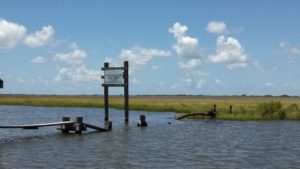
This area was once covered by marsh, but it’s far easier to boat through water than plants, so we’ve cut through the marsh with navigation channels. This increases the amount of marsh exposed to regular wave action and can increase erosion.
I spent the last few days at a conference in New Orleans about the changing Gulf Coast that brought together researchers, engineers, long-time residents, and a wide variety of other people. The point was to share information and viewpoints about what is happening along the coast over the short- and long-term. Sea-level rise and climate change are concerns, development is a concern, fisheries are a concern, etc. And something that was mentioned on a regular basis was the loss of wetlands as water levels go up, land compacts downward, and areas get broken up into smaller and smaller fragments. This is something I have seen myself during several years of research in coastal Louisiana- spaces that are land on a map show a mosaic of land and water when you drive by, grassy islands in interior bays get smaller with every storm.
I know that wetland loss is a major issue in Louisiana and elsewhere, but I’m not sure about all of the details. Where I work, the combined forces of rising seas and subsiding land are the main factors, but I don’t know how representative that pattern is of other locations. I’ve heard that wetland loss in Louisiana is a big deal because Louisiana contains such a large portion of the wetlands in the US, but surely there are other areas we should be paying attention to as well. And I’m really curious about what can be done to slow or even reverse wetland loss in different situations- I’ve heard a lot about sediment deposition and the idea that confining the Mississippi between levees to prevent floods has deprived the surrounding wetlands of the sediment they need to keep their heads above water, but does that mean that our only option is to ‘free’ the rivers, because that could be a hard sell in some communities. And some wetlands aren’t connected to river deltas, so what’s going on there?
So following all of the discussions and ideas about coastal ecology that I’ve heard this week, I’m going to focus on wetland loss and conservation in my blog this month. Let’s see what the state of the world’s wetlands is.
